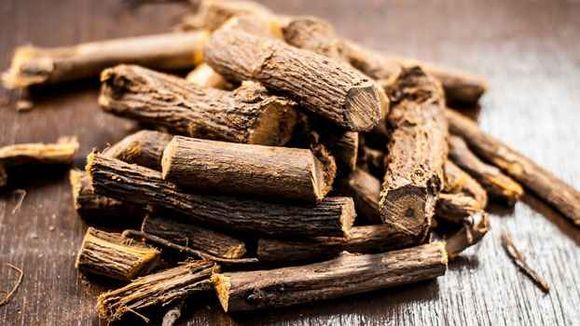General information about licorice
Licorice, also called liquorice or liquorice, is a perennial herbaceous plant. It is grown mainly in Greece, Turkey and Western Asia. It has been used since ancient times as an expectorant that helps clear excess mucus from the upper and lower respiratory tract.
The healing parts of the plant are the unpeeled dried roots and branches and the underground stem (rhizome). Licorice contains the compound glycyrrhizin, which is 50 times sweeter than sugar. However, taking too much licyrrhizin licorice glycoside can cause fluid retention and lead to increased blood pressure (hypertension).
In traditional Chinese, Middle Eastern and Greek medical systems, licorice is used to soothe an upset stomach, reduce inflammation and treat upper respiratory problems. 1 To date, many people use licorice root to treat health problems, such as acid reflux, hot flashes, coughs, and bacterial and viral infections. It is available in the form of capsules or liquid supplements, and as a tea, licorice soothes a sore throat. There are also topical gels that can be used for skin conditions, such as acne or eczema. 2
Plant active compounds in licorice

Although it contains hundreds of plant compounds, the main active compound of licorice root that deserves attention is glycyrrhizin. 3
Glycyrrhizin is responsible for the sweet taste of the root, as well as its antioxidant, anti-inflammatory and antimicrobial properties. Paradoxically, glycyrrhizin is also associated with many of the adverse effects of licorice root, if any. To avoid such effects, deglycyrrhized licorice (DGL) has been incorporated into some products, which has been removed with glycyrrhizin.
Other active compounds that have been isolated from licorice are triterpene saponins and flavonoids. They demonstrated hypoglycemic, antimicrobial, antiviral, antidiabetic, anti-inflammatory, and hepatoprotective effects. 4
Medical Uses of Licorice
Licorice root is used for a variety of conditions, including eczema, bronchitis, constipation, heartburn, stomach ulcers and menstrual cramps. Let's look at some more interesting areas where sweet root has a beneficial effect.
Licorice for respiratory problems
Licorice root is believed to support and protect the respiratory system. In a laboratory study, glycyrrhizin, the main active ingredient in licorice root, was found to have the potential to improve the effectiveness of bronchodilators in people with asthma and chronic obstructive pulmonary disease. 5
Another laboratory study found that glycyrrhizinic acid and oleanolic acid found in licorice root have an antioxidant effect that can help protect cells in the bronchi. 6
Licorice in functional dyspepsia
Licorice root may help relieve pain in functional dyspepsia, a disorder characterized by bouts of discomfort in the upper abdomen.
In one study, 50 people were given either a placebo or a product made from licorice root extract at a dose of 75 milligrams twice daily for 30 days. The group that took licorice extract reported greater relief of dyspepsia symptoms than participants in the control group. More research is needed before determining whether licorice root can be used as a safe and effective remedy for this condition.
In another 8-week study in 58 adults with GERD (gastro-esophageal reflux disease), a low dose of glycyrrhetinic acid (a glycyrrhizinic acid hydrolytic product) in combination with standard treatment resulted in significant improvement in symptoms.
Anticancer properties of licorice
Due to the content of numerous plant compounds with antioxidant and anti-inflammatory effects, licorice root extract has been studied for its protective effects against certain cancers.
In particular, licorice extract and its compounds have been linked to slowing or preventing cell growth in skin, breast, colorectal cancer, and prostate cancer. 7 However, studies have been limited to in vitro and animal studies and have not been conducted on human cancer cells.
Licorice to alleviate upper respiratory conditions
Due to its anti-inflammatory and antimicrobial effects, both licorice root extract and licorice tea can help with diseases of the upper respiratory tract.
In particular, animal studies concluded that licyrrhizin extract from licorice root helps relieve asthma, especially when used with modern asthma treatments. And here we need human studies to confirm such effects.
Licorice May Prevent Caries

Licorice root can help protect against bacteria that can lead to tooth decay. In a three-week study, 66 preschoolers were given sugar-free lollipops containing 15 mg. licorice root twice a day during the school week. The consumption of lollipops significantly reduces the number of bacteria Streptococcus mutans, which are the main cause of cavities.
Licorice in menopause and menstrual symptoms

Licorice root can help relieve symptoms of menstruation and menopause. In a small study, licorice root extract was compared to ibuprofen for pain relief in women with dysmenorrhea or menstrual cramps. The results of the study show that licorice root can be used to relieve the pain of menstrual cramps due to its anti-inflammatory properties. 8
Potential side effects and precautions
While it is safe for use in foods, chronic use and large doses of licorice root products can lead to glycyrrhizin accumulation in the body. Elevated glycyrrhizin levels have been shown to cause an increase in the stress hormone cortisol, which can cause an imbalance in fluid and electrolyte levels. Because of this, people with high blood pressure, congestive heart failure, kidney disease, or low potassium levels are encouraged to completely avoid licyrrhizin-containing licorice products.
Pregnant and nursing mothers should also avoid consuming licorice, or if they do, be in minimal quantities.
Drug interactions
It has been proven that licorice root interacts with several types of drugs, including:
- Blood Pressure Medications
- Blood thinners
- Cholesterol-lowering medications, including statins
- Diuretics
- Estrogen-based contraceptives
- Nonsteroidal anti-inflammatory drugs (NSAIDs)
Dosage and forms of licorice root
There are currently no universal dosage recommendations. However, the World Health Organization (WHO) and the European Food Scientific Committee (SCF) recommend limiting glycyrrhizin intake to no more than 100 mg. per day. If licorice products do not have such information, another option is to look for powders or capsules with deglycyrrhized licorice (DGL).
These supplements do not contain glycyrrhizin, which is responsible for most side effects. Yet, since this compound also contributes to numerous benefits, it is unclear whether products with deglycyrrhized licorice have the same positive health effects.









